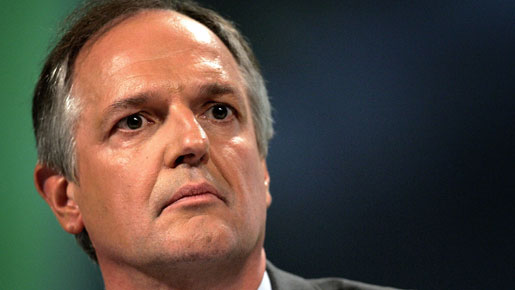
The irony can’t be lost on Paul Polman – or Procter & Gamble. For more than 25 years new Unilever CEO Paul Polman laboured at the world’s biggest personal care company only to switch allegiances to arch food-to-soaps-to-ice cream rival Unilever just over a year ago. Unilever certainly needed a boost. For some time it had struggled to restructure itself successfully. Success – partial, at least – had begun to glimmer under ex-CEO Patrick Cescau but it was pretty faint stuff.
Since the start of 2009, Unilever’s share price has roared back to health by more than 20 percent (P&G, in contrast, has struggled to improve by four percent). And there is a buzz about the massive personal care company that was distinctly missing only 18 months ago. Polman knows there are huge opportunities in India and China. And he appears to have the support of most shareholders and analysts thanks to delivering sound quarterly results through a hugely difficult year. The pace is picking up – at last.
Strong financial manager
Polman has all the experience needed, say analysts, to make a difference to the stolid, conservatively managed Anglo-Dutch business. He has huge knowledge of Unilever’s key rivals, P&G and Nestlé, as well as several decades immersed in the nitty gritty of getting consumers to buy more home and personal care products. His experience at Nestlé – he was with the Swiss group just two years as CFO – saw Polman swing an axe on many product lines. Most of the techniques he wrought (with great effectiveness) were learnt from P&G who for many years had delivered stellar results under the stewardship of CEO A.G. Lafley. The more open American environment at P&G must have been a shock to Swiss-based Nestlé, and Polman’s new presence at Unilever must also be uncomfortable for some divisions long-settled in familiar, comfy routines.
However he has spent much of his working life in Europe – he was born in a small Dutch town – and his style is hands-on. He’s a competent linguist fluent in Dutch, French, English, German and Spanish; his management style is said to be informal and he regularly takes early morning jogs with junior execs (he’s a keen long distance runner); there’s little boardroom aloofness about him. Yes, originally he would have been in line for the top job at P&G but spending so much time in Europe probably cost him presence back at P&G’s Cincinnati HQ – and possible influence too. If he ever felt any twinges of revenge, then these must have been surely sated now.
In truth however, much of the tough donkey work has already been done already. Predecessor Cescau kicked away its lumbering dual-board structure, slashed jobs and got rid of several low-margin businesses. Much of Cescau’s work has never been given the credit it deserved. Polman’s task, then, is to continue this work, but he will want to maintain an urgency with the changes that the older man lacked. No wonder shareholders and analysts are positive on his appointment. “Polman is probably the best candidate in the world to become CEO of Unilever,” said analyst James Amoroso at the time of Polman’s new role. “With hindsight he was probably the only logical choice.”
Hungry for more brands
Meanwhile, Polman is on the prowl for acquisitions – but they must be right. Unilever alone has more than 400 brands including Hellman’s mayonnaise, Surf washing powder and Ben & Jerry’s ice cream and it doesn’t need to add to that number, unless they’re absolutely right for the portfolio. Recently Unilever agreed to pay €1.3bn for a bunch of Sara Lee personal care brands, which included Radox and Sanex; these should integrate well with Unilever’s own skincare and body products as well as prove a spoiler to P&G, which is also keen to expand its personal care and cosmetics range. Its recent Q3 results were more reasons for investors to feel cheerful. Underlying sales volumes right across the group rose nearly four percent. Hugely impressive considering the current economic backdrop, though substantial price cutting, it must be said, also played its part here.
So all is rosy? Not quite, unfortunately. The move to appoint an outsider to Unilever’s top job was a damning judgment on the current crop of internal talent within the company, especially as it had a long tradition of recruiting internally. There are strong candidates still inside Unilever but Unilever plainly has not been as strong at recognising and nurturing talent as it could have been: it had to close the door on its own front bench to put Polman in the top job. One suspects that Polman will want to address this issue. But the decision to install Polman in the top seat is also testament to Patrick Cescau’s willingness to recognise the seriousness of the situation – no easy decision. But almost certainly the right one.
Nearly wiped out
Last year’s bomb attack on the Taj Mahal hotel in Mumbai was a close call for Polman. He and ex-Unilever boss Patrick Cescau found themselves trapped in the besieged building while Islamic terrorists rampaged through the corridors attempting to take hostages, subsequently killing many. Unilever staff have not talked about the episode to the media but is thought that Polman, Cescau and staff bolted themselves in one of the private suites which managed to resist the terrorists – though only just. Guests in adjoining rooms were taken hostage and executed. Polman and staff later escaped in a prison-style breakout using curtains and climbing down the building to safety. The pair were there to visit Unilever’s extensive Mumbai Hindustan Unilever operation, which is 51 percent owned by Unilever.
Both have returned to the Taj Mahal since the terrifying ordeal subsequently to “finish their meal”. The episode however has brought home the need for succession planning. Unilever is a huge company and a wipe-out of its top brass would be a devastating, unimaginable loss to their families, staff and shareholders.

